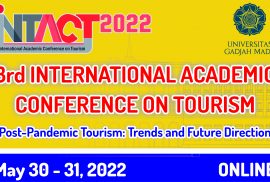Starting from Wuhan, China at the end of 2019, the COVID-19 pandemic has now been entered to the end of its second year. This disaster has apparently paralyzed the tourism sector. The movement of global tourists has been decreased very drastically to reach 78% or 1.1 billion (Inventure, 2020) due to the lockdown policy in tourism destinations. UNWTO estimates between US$ 910 to US$ 1,200 billion in losses to the tourism industry from the cessation of global tourist travel. International flights stopped and are followed by the interruption of the activities of related sectors in tourism destinations. In addition, it is predicted that between 100 and 120 million jobs are at risk of being lost or at least vulnerable to risk. More specifically, women workers who are the largest segment of workers in the tourism sector are at risk of losing their livelihoods.
Arsip:
About
In the keynote speech session, all participants are expected to attend. Participants who attended the keynote speech session are: tourism actors, policy makers, academics, and the general public who observe tourism.
In the paper presentation session, the targeted participants are academics, and researchers.
This conference is expected to produce main outputs, namely:
- Construction of critical thinking (theory and practice) about the direction of tourism development in the post-pandemic period
- Recommendations and strategies for adapting and developing the industry to the new tourist market demand trends
- Compiled academic writings on critical perspectives on the trend and direction of future tourism development (post-pandemic)
- Abstract Submission Deadline:20 March 2022
- Acceptance Notification:30 March 2022
- Payment Deadline for Presenter:30 April 2022
- Full Paper Submission Deadline:30 April 2022
- Conference Dates:30 – 31 May 2022
This international conference aims to discuss and provide critical views based on empirical experience and the relevant concepts to the changing trends and future directions of tourism development after the Covid-19 pandemic.
Some of the topics that can be raised as discussion material include (but are not limited to):

